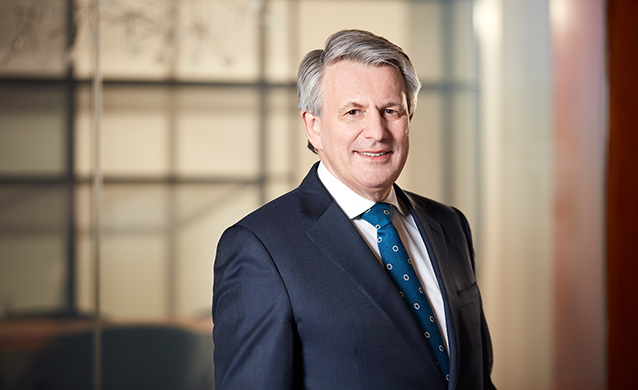Economic development in Nigeria
Special report
Shell has interests in several companies in Nigeria that help power economic growth and improve the quality of life for Nigerians. Safety and security remain top priorities and we continue to work closely with communities, civil society, contractors and joint-venture partners, and federal and state government agencies to create a safe operating environment.
Shell Companies in Nigeria also contribute social investment in communities and support the development of Nigerians and indigenous companies.
Visit www.shell.com.ng/nigeria-briefing-notes for more on Shell in Nigeria.
Powering Nigeria’s economy
In 2019, the Shell Petroleum Development Company of Nigeria Ltd (SPDC), the operator of the SPDC Joint Venture (SPDC interest 30%), focused on restoring and repairing wells and pipelines in the Niger Delta to restart oil and gas production. Some wells that were closed for about 20 years are producing again. The Trans Ramos pipeline is also supplying oil and gas for export after being shut due to leaks in 2018. The result is an increase in production of nearly 10% on 2018.
SPDC also continued to make progress on developing several large gas projects that are key to eliminating continuous flaring from its operations. Since 2002, flaring has been reduced by 90%. Gas that was once flared is now captured and processed for domestic and international gas markets. Gas is sent for the export market as liquefied natural gas (LNG) or channelled into the domestic Nigerian gas market. Here, it displaces diesel generators to provide cleaner, reliable and affordable power for industrial and commercial customers.
In 2019, SPDC made significant progress with new gas production from two large projects: Southern Swamp and Forcados Yokri. Gas from the Southern Swamp is intended for export as LNG, providing revenue to the government and opportunities for expansion.
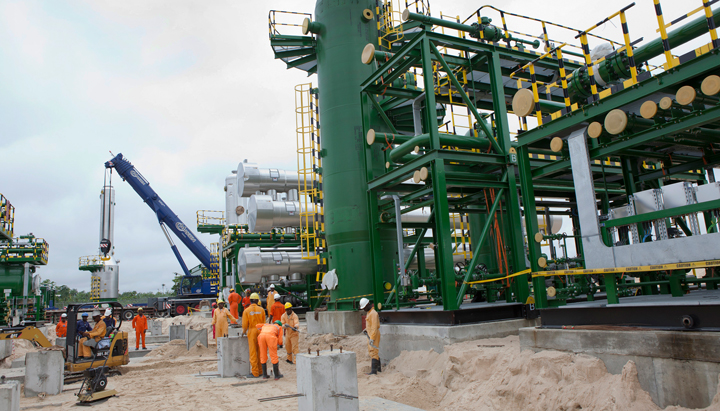
The Tunu gas-gathering project is part of the Southern Swamp Associated Gas Solutions initiative and is designed to manage natural gas produced along with oil.
Gas from Forcados is expected to be sent to the domestic Nigerian market to provide clean reliable power for more than 100 industrial and commercial customers through Shell Nigeria Gas Ltd. Customers include a large float glass manufacturer, a pharmaceutical factory as well as large commercial market zones and local and international consumer goods companies.
SPDC has taken big strides in building what is expected to be the largest gas facility in the country at the Assa North-Ohaji South project. When completed, the processed gas is expected to further boost gas supplies to industrial and commercial customers in Nigeria and boost economic prosperity for the growing population.
Flaring from SPDC increased slightly in 2019 due to the construction of these gas facilities. Once fully functioning, the facilities’ overall contribution will be significant in eliminating continuous operational flaring in Nigeria.
Expanding in deep-water oil and gas
Unlocking the oil and gas resources in the deep waters of the Gulf of Guinea can help meet growing energy demand in Nigeria and international markets. Shell works with local Nigerian companies and develops the skills and experience of Nigerian employees.
The Shell Nigeria Exploration and Production Company (SNEPCo), operator of the Bonga field, produces 12.5% of Nigeria’s oil production. This generates significant and stable revenue for the government through taxes, royalties and levies. In 2019, SNEPCo continued to use its knowledge, experience and proven deep-water technologies to unlock new resources safely and efficiently. For example, the company used a specialised twin-deck drillship over the Bonga field to reduce the cost and time to complete a well-drilling operation. This involved a technique known as single trip completion, which combined fine instruments and careful planning. It was developed with Schlumberger and used for the first time anywhere in the world in Nigeria.
In 2019, SNEPCo continued to take steps to add production in deep water. The company invited contractors to bid to develop the Bonga South West Aparo field. The project’s first phase will include developing around 20 deep-water wells and subsea infrastructure, and building a floating production, storage and offloading vessel.
Contribution to society
Shell Companies in Nigeria continue to support the development of local communities and companies as part of their contribution to the economy. These companies also work with others such as the government to run social investment programmes. In 2019, Shell-operated ventures contributed $40 million in social investment projects, mainly in enterprise support, education, health care and road safety.
External voice

Yolo Bakumor Smith
CEO, De-Rabacon Plastics
De-Rabacon Plastics is a Nigeria-based plastic recycling and waste management solution company that recycles end-consumer plastics into viable commercial products such as pavement blocks, buckets, cans and carpets. The company won the maiden Shell Top Ten Innovators Award’s Outstanding Achievement Award in 2018.
“There is often a paper-thin line between success and failure in business, especially for a start-up. The training, support systems and valuable networks I have gained over the last 5 years, courtesy of Shell LiveWIRE, have gone a long way to ensure that my business start-up, De-Rabacon Plastics, is thriving.
“Shell’s approach on supporting local enterprises to grow and excel is enabling us to scale up our business and focus on designing eco-friendly, energy-efficient and affordable products. Today my organisation employs 16 people and has recycled over 800,000 tonnes of plastic waste. We plan to achieve two million tonnes by the end of 2020.”
In 2019, Shell companies awarded contracts worth more than $1.1 billion to Nigerian firms and helped to develop infrastructure.
SPDC worked with around 286 Nigerian companies and about 3,000 Nigerians to deliver the Southern Swamp Associated Gas Solution project. The contracted companies provided services including building processing facilities, laying pipelines and providing commercial offshore divers.
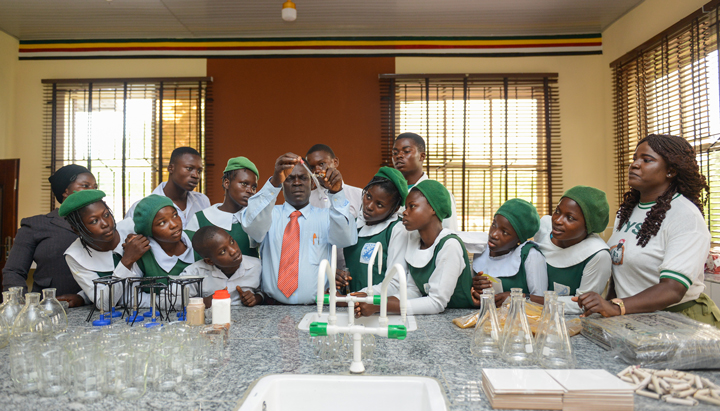
SNEPCo's social performance programme involved building and equipping a chemistry laboratory at the Eruku Integrated Ultra-Modern Science Laboratory in Kwara State, Nigeria.
Improving health care
We run various health care projects in Nigeria, often in partnership with local authorities or development bodies. We aim to improve access for local people to health care and treatments for diseases such as cancer. We also have health facilities for employees, contractors and, where possible, local people.
Access to health care is provided through a community health insurance scheme, which was set up in 2010 by SPDC, Rivers State government and local communities. Since 2010, more than 67,000 people have enrolled.
The scheme provides access to the Obio Cottage Hospital in Port Harcourt, which remains one of the most visited health facilities in the Niger Delta. SPDC set up the hospital in 2010. It specialises in maternity health care and in 2019 was the birthplace of about 300 babies each month. The hospital includes a vaccination clinic, screening to prevent the passing of HIV from mother to child and an operating theatre.
In 2019, SNEPCo collaborated with the Nigeria Federal Ministry of Health to improve cancer care. They invested around $1.5 million to upgrade the National Hospital Abuja. The funds went towards the procurement and installation of a world-class radiotherapy machine within the facility and medical staff training.
Tackling plastic waste
In 2019, Shell Companies in Nigeria announced plans to reduce single-use plastic at facilities by at least 50% by 2020. They began by introducing alternatives such as water refill stations and reusable water bottles. Some sites made significant progress, including the Gbaran-Ubie facility that reduced single-use plastic by 90% in 2019, a drop from around 10,000 1.5 litre bottles a month to 1,000.
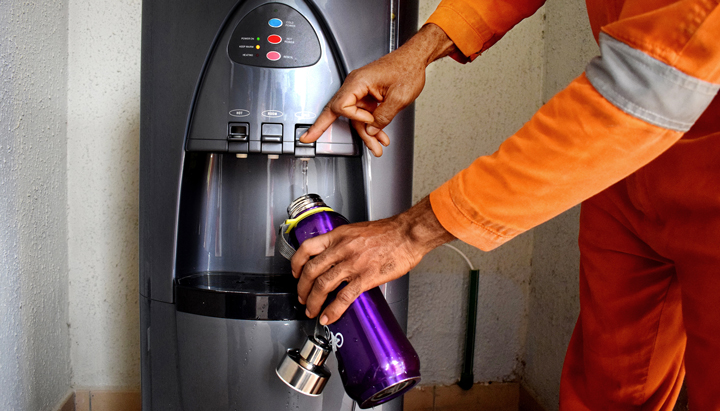
A Shell employee at the Gbaran central processing facility refills his water bottle as part of efforts to tackle plastic waste.
Operating safely
The safety of employees and contractors in Nigeria remains our top priority. Shell companies aim to achieve no harm to people and no leaks across operations. We refer to this as our Goal Zero ambition.
In 2019, we focused on three safety areas: improving how managers stop unsafe work in their teams, preventing objects being dropped from height – a common hazard in the industry – and marine safety.
Sadly, in 2019, two contractors working for the Shell Petroleum Development Company of Nigeria Ltd died when a vessel they were travelling on capsized in bad weather. An investigation into the incident is ongoing.
In 2019, there were 16 cases of personal injuries that required medical treatment or time off work at Shell Companies in Nigeria.
Shell Companies in Nigeria continue to contribute to the safety of communities around facilities by responding to third-party fires and emergencies. In 2019, Shell companies responded to 44 of these incidents, including an overturned fuel tanker and a search and rescue operation on a collapsed hotel building under construction, both in Port Harcourt.
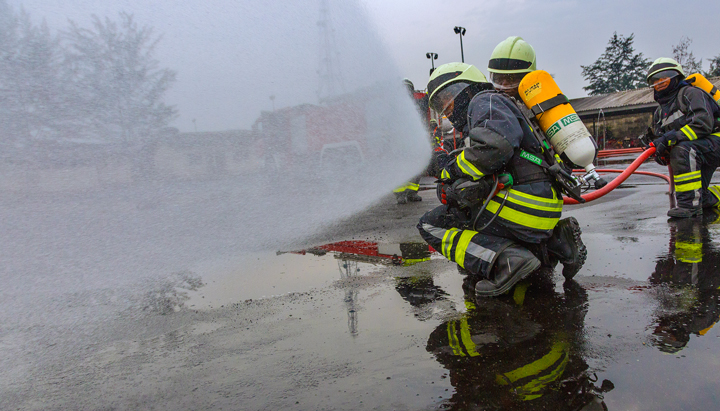
Firefighters from Shell Nigeria Emergency Services take part in emergency training in Port Harcourt.
 Climate change
Climate change
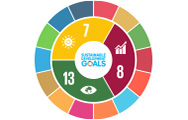 Sustainable development goals
Sustainable development goals
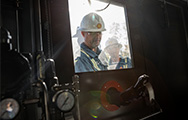 Safety
Safety
 About our data
About our data
